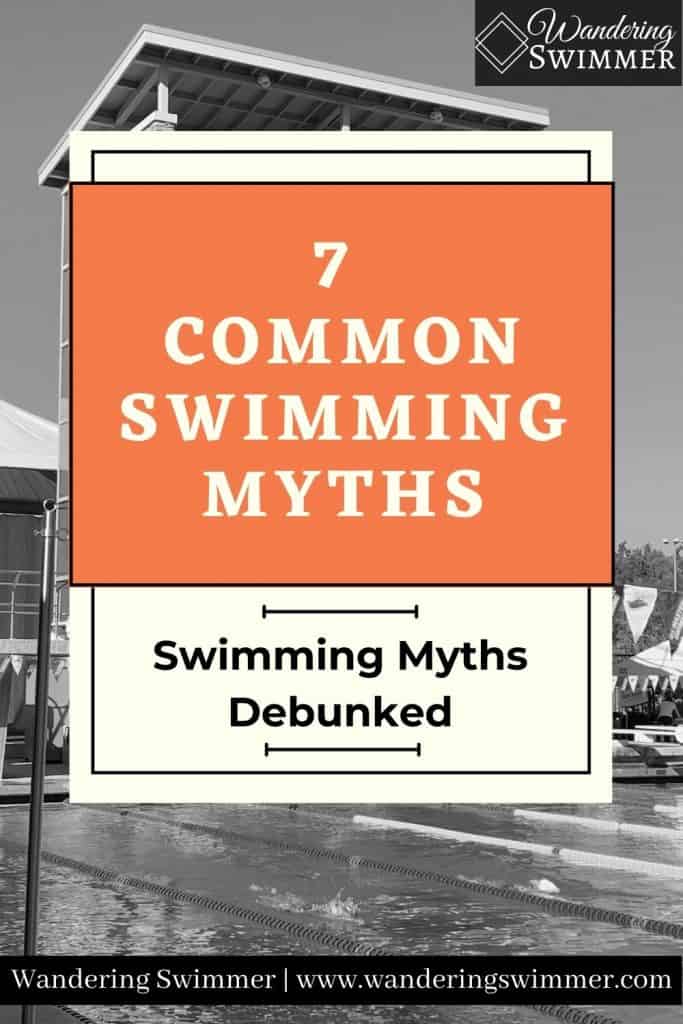Looking to get some laps in at the pool? Swimming is a fantastic way to exercise. It’s a full-body, low impact workout that burns hundreds of calories while doing so. Making it the best way to get into or keep in shape and even lose weight.
More Content for You: 6 Reasons to Wear a Swim Cap
Certain swimming myths though, will keep some people out of the water and keep them from enjoying the benefit that swimming has to offer.
Think you know the answer to some of these beliefs that surround swimming? Let’s debunk these 7 common swimming myths.
Disclosure: This post may contain affiliate links, meaning I earn a small commission at no cost to you if you purchase something through one of my links. As an Amazon Associate, I earn from qualifying purchases. Please check out my disclosure page for more information.

1. You Can Only Learn How to Swim As a Child
This is one of the biggest swimming myths that seem to stick around. And it’s completely false!
It, unfortunately, leads to many teens and adults never attempting to learn to swim, even though it’s a life-saving skill.
The fact of the matter is that you can learn to swim at any age. Whether you’re 8 or 88. Most swim schools now offer swim lessons for adults. And programs such as Masters Swimming actively encourage adults to swim.
Related article: Why You Should Join Masters Swimming
Masters Swimming is geared strictly to adults. Swimmers from ages 18 – 100 learn how to swim, train, and compete regardless of their age and experience level. It’s never too late for you!
Additionally, US Masters Swimming offers coaching with instructors certified in teaching adults how to swim. Because you’ll find that learning to swim as an adult is vastly different than as a child.
2. Hydration is Optional
Some swimming myths can be dangerous to believe and this is one of them.
Because you sweat in the water, just as you would if you walked, biked, or did some other form of exercise. Just because the water conceals the sweat doesn’t mean that it’s not there.
For this reason, it’s important that when you’re swimming, you keep hydrated. Have a reusable water bottle with you whenever you’re at the pool. Especially if you’re swimming outside. Or, if the water is exceedingly warm.
Related article: Reusable Water Bottles and COVID
It might seem like the water feels good and that you’re not sweating, but I promise you are. Becoming lightheaded while you’re in the water due to dehydration is a dangerous combination.
This leads us to our next point!
3. You Can Swim/Train Alone
I cannot stress this enough, but it’s not safe to swim alone. In the pool, in the lake, or out in the ocean. You should always have someone close by to watch you.
Whether you’re a great swimmer or an average swimmer, accidents happen. People can overestimate their swimming ability or not realize how tired they are.
More Content for You: How Much Does Swimming Cost?
It’s one reason swimmers should always watch out for each other, even if a coach or lifeguard is on deck. Drowning isn’t always noisy and frantic. It’s usually quiet because the person struggling doesn’t have enough oxygen to call for help.
While this is maybe more of an individual belief and not a swimming myth, it’s still important to note.
Always swim with a buddy, let someone know when you’re going out swimming, and never swim by yourself. If you’re swimming in open water, always remember to wear a brightly colored cap and a swim buoy.
Your life isn’t worth your pride.
4. You Can Eat Whatever You Want
Eh. This is a yes and no myth.
Because while swimming does burn hundreds of calories, it varies based on intensity, duration, and frequency.
For those who do lap swimming to lose weight, stay in shape, or build muscle, it’s best to stick with a balanced diet.
More Content for You: How to Fix Common Swim Goggle Problems
That means not eating fast food for every meal. Or eating sugary desserts all the time. On occasion is okay. But don’t think that just because you’re swimming daily or a few times a week means that you shouldn’t watch what you eat.
Not sure what your nutrition should look like while you’re swimming? Talk to your doctor or a nutritionist to develop a plan that works best for you and your lifestyle.
5. Waiting to get in the Water After Eating
Much like eating whatever you want, this swimming belief comes with a clause. Mainly because it varies by person.
If you’re swimming laps or training, you should eat something before working out. Your body will need that energy to make it through your workout time without leaving you feeling like overcooked pasta.
Again, there’s a ‘but’ to this.
You have to watch what and when you’re eating. We wouldn’t recommend eating a large meal minutes before getting into the water. While you may or may not cramp up, you still run the risk of throwing up in the water.
A small snack though just before a workout, such as a banana, some pasta, or fruit, is easier for the stomach to handle.
If you’re ever not sure, play it safe!

6. Can’t Swim on Your Period
This is a frequent swimming myth for those that menstruate. You can (and should) swim while you’re on your period! Menstruating is a normal body function and is nothing to be ashamed of.
It’s safe, and activities such as swimming can actually help you with cramps.
A side belief about swimming on your period is that you don’t need to use products. While it’s true that water can slow your flow down, it doesn’t stop the bleeding entirely. Especially if you’re on a heavy day.
Related articles: Swimming on Your Period FAQ
If you want to swim during your period, be sure to use either a tampon or menstrual cup. Never use a pad in the water!
But mainly, don’t worry or feel embarrassed. You’re not alone in this 🙂
7. Chlorine Turns Your Hair Green
If you never wash your hair this might happen!
The truth to this myth though is that it’s not the chlorine that turns hair green, but rather it’s water with high levels of copper. Much like how a penny turns green because of its copper components!
Those with blonde hair might seem some green tints in their hair, but with a good shower, the green will go away.
To prevent this and keep your hair from drying out (which chlorine will do!), you should look at swimming with a swim cap. This will help keep your hair healthy, out of your face, and out of the pool!
You can also look at using hair care products specific to swimmers that help remove the chlorine from your hair. Two brands to consider are TRISWIM or UltraSwim.
In Closing
If you’ve been on the fence about swimming because of some of these misconceptions, I hope you’ll give it another chance!
Swimming offers numerous health and mental benefits for everyone. Whether you decide to swim competitively or for leisure!
As always, to happy swimming!
Chevron
Bonus Content:
Swimming Basics to Get You Started: If you just started to swim, you might feel that swimming can be overwhelming. Here are some swimming basics to help you feel more comfortable at the pool.
4 Ways to Prevent Swimmer’s Ear: Swimmer’s ear can be a painful experience if left untreated. Here are 4 options to help you prevent swimmer’s ear and enjoy your summer.

Want to Improve at the Pool?
Join swimmers and swim parents to receive my free newsletter and receive a free Swimming Glossary e-book as a thanks!
Every month you’ll receive tips and coaching to help you find success at the pool.